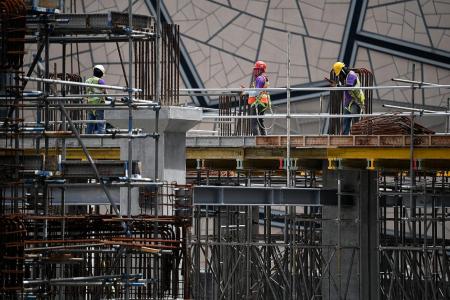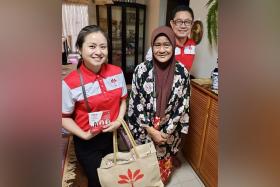MPs call for foreign labour policy review, more focus on local workers
It is time to review Singapore's foreign labour policy and see if the country can become less dependent on foreign workers, said Mr Liang Eng Hwa (Bukit Panjang).
For years, foreign workers have helped fuel Singapore's progress and complete large-scale infrastructure projects. However, two major events recently have made clear the need for a review, he said.
First is the Covid-19 outbreak in foreign worker dormitories, when thousands of foreign workers were infected with the coronavirus, and which highlighted "unanticipated costs" in Singapore's reliance of foreign labour, said Mr Liang.
The second event, he added, were the Little India riots in 2013.
Despite measures taken after the two events, more can still be done to wean from foreign labour, he said.
SECOND DAY
On the second day of the debate on the President's Address in Parliament yesterday, Mr Liang was among several MPs who focused on Singapore's foreign labour policies and issues facing local workers in a tight labour market.
There is a need for foreign labour in sectors such as construction, but more must be done to improve productivity, he said.
For the construction sector, the Government can encourage productivity, for instance, by awarding tenders to companies that use productive construction methods, and rely less on foreign workers.
Demand for foreign labour can also be reduced by being more discerning about major construction projects, Mr Liang said. For example, it is wasteful to demolish buildings in good condition, only to replace them with similar buildings in the case of some developments sold en bloc, he added.
He also asked if it was necessary to proceed with plans to build Changi Airport's Terminal 5, especially when air travel is expected to decline due to the Covid-19 pandemic.
Mr Liang said he welcomed last week's news that the minimum qualifying salaries for Employment Pass (EP) holders will be increased.
To complement this, Singapore needs to maximise the potential of its local workforce, he added.
Ms Tin Pei Ling (MacPherson) made similar suggestions when she called for more focused efforts to nurture the soft skills of local workers. These include leadership and communication skills, which are invaluable compared with paper qualifications, and greater emphasis must be placed on them.
Singapore's education system needs to make sure its citizens remain the preferred choice of employers by cultivating these skills, and the Government should formulate a plan to groom young adults in the local workforce for potential leadership positions, she added.
Cases where a local professional is passed over for a foreigner have given rise to complaints about discrimination, said Ms Joan Pereira (Tanjong Pagar GRC).
She urged the Government to do more to prevent such hiring biases, and said that while she supported increasing the qualifying salaries for EP holders, this was not enough. She suggested improving reporting hotlines to make it easier for whistleblowers to report such practices.
Get The New Paper on your phone with the free TNP app. Download from the Apple App Store or Google Play Store now



